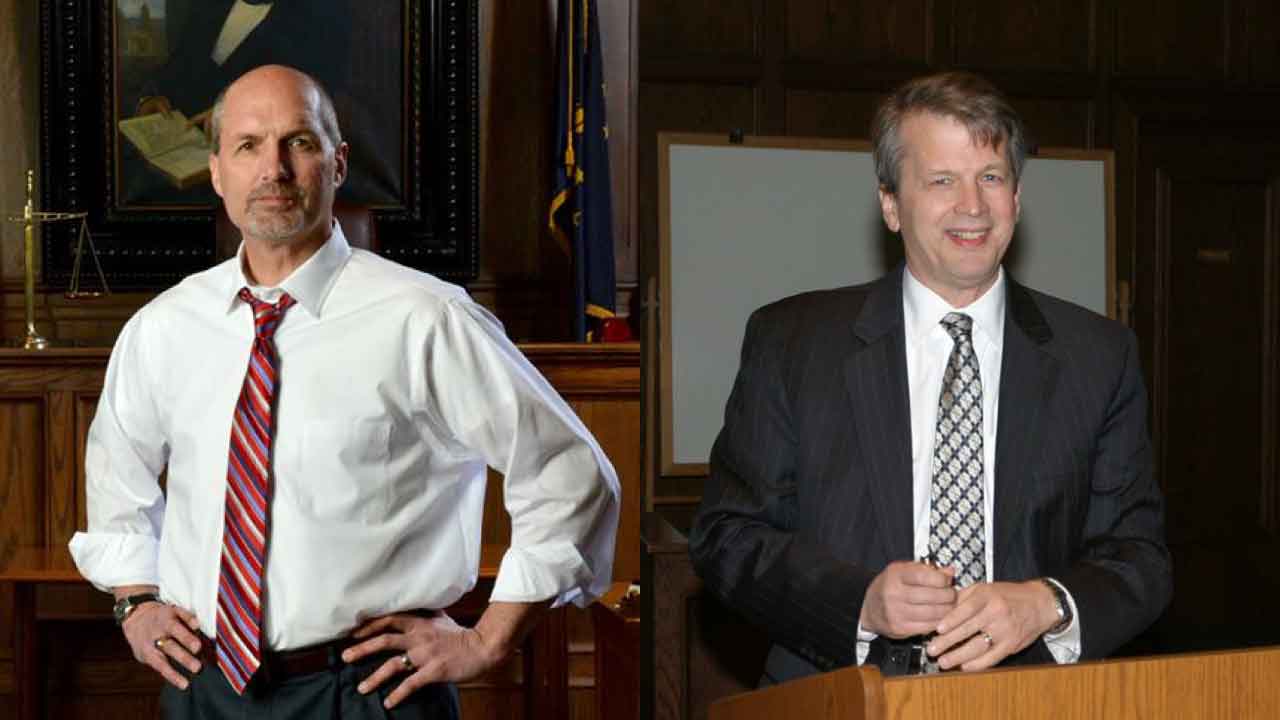The South Bend Voice is publishing a series of articles on local candidates running for county offices this fall. We believe that it is vitally important for voters to be informed before they head to the ballot box on November 4.
While we do not endorse individual candidates, we will provide the equal opportunity for candidates to share their views with the public through a short statement and questionnaire.
The statement is a concise explanation of a candidate’s experience, priorities if elected, and why they would make the best choice for voters.
Both the candidate statement and response to our questionnaires are being published verbatim. No alterations have been made — even for spelling and grammar. We believe that our job is to ask the tough questions and candidates’ responsibility is to speak directly to voters.
With that said, let’s introduce the two candidates for St. Joseph County prosecutor.
Quick Facts
Full Name: Kenneth “Ken” Cotter
Current Job Title/Employer: Chief Deputy Prosecutor, St. Joseph County Prosecutor’s Office
College Major: Government History, BA (1984) and JD (1990)
University Alma Mater: University of Notre Dame
Experience in Elected Office: This is my first campaign for election though I have 19 years experience within the Prosecutor’s Office, including 12 as a Chief Deputy.
Full Name: Jeffrey L. Sanford
Current Job Title/Employer: Attorney at Law
College Major: History
University Alma Mater: Purdue University – BA / Valparaiso University Law School – JD
Experience in Elected Office: None
Candidate Statement – Ken Cotter
My name is Ken Cotter. I was born in St. Joseph County, raised in St. Joseph County, and continue to live in St. Joseph County. I have worked in our criminal justice system most of my professional life.
Your choice for Prosecutor should not be a decision based upon politics, but rather a decision based upon the particular people running for the job. Our community needs the best person for the job, regardless of what particular party name is next to the candidate’s name. My experience as a trial deputy prosecutor, my established relationships for more than 20 years with law enforcement officers, and my love of this community, make me the person to be your next Prosecutor.
My philosophy as your Prosecutor is relatively straightforward: we need to keep violent criminals off our streets, rehabilitate those who can contribute to our community, and make sure that crime victims are respected.
To reach those goals, we need to continue to target violent crime, build upon what we have already done and hold offenders accountable for their actions.
I plan to continue to build on my two decades of support and partnership with our local law enforcement. As a prosecutor, I have had the opportunity to get to know the officers of our local police departments, and they, me. I do not believe that a prosecutor should merely review police reports in making a decision. Instead, a prosecutor should discuss cases with the investigating officers (including patrol and detectives). To achieve this end, I have been available to consult with officers 24 hours a day, 7 days a week. I have been at the scene of a crime more times than I can count. As your Prosecutor, I will continue to partner with our officers, and will ensure that the younger deputy prosecutors do so as well.
Crime knows no boundaries. I’ve worked with law enforcement and the prosecutor’s offices of our neighboring counties (including Marshall, Elkhart, Berrien and Cass Counties). Those relationships are vital in tracking and stopping criminals. By working with other jurisdictions, we are better able to hold those offenders accountable. I have worked during the past 20 years on building those partnerships and will continue to do so as Your Prosecutor.
My office will continue to serve the needs of victims. All victims should be respected, consulted, and kept informed. I will continue the role of our Victim Advocate Division. While the law does not make victims responsible for prosecutorial decisions, it does require that victims be given the opportunity to understand what is happening in their case, and to give them the opportunity to be heard; making a recommendation on the ultimate resolution.
In short, the job of the Prosecutor is to do what is right and what justice demands. With your help, I will ensure that justice is served in St. Joseph County.
Candidate Statement – Jeff Sanford
I am Jeff Sanford, the Republican candidate for the office of prosecuting attorney. I have been practicing law for over 25 years. I have been a public defender, deputy city attorney and I maintain a private practice.
I started my legal career working for Mike Barnes in the Prosecutor’s Office. The prosecutor’s office is the only area of the law where decisions made can result in a person going to jail. That burden requires the Prosecutor’s Office to perform its job responsibly and competently. When charging a crime, a prosecutor must be confident that both the proper crime and person are being charged. Once a defendant is charged, a prosecutor has the duty to all citizens to present the case in a competent manner. Trying a case competently requires knowledge of the rules of procedure, evidence, and questions that need to be asked to prove the case. I was supplied with the necessary tools to succeed, and my training continued throughout my time with the prosecutor. In addition to the training, I was given almost complete discretion to perform my job. I was allowed to think for myself, however I was never exposed to situations I could not handle.
Unfortunately, for quite some time, I have experienced how poorly the prosecutor’s office has come to perform its job. All too often, charges are filed that lack the necessary evidence to prove the charge, either because the office doesn’t realize it lacks the evidence or because it doesn’t realize that the law does not support its case. Cases are lost because the deputies lack the skill, training and experience to ask the proper questions or get necessary exhibits into evidence. As a result, cases that should be won, are lost at trial.
From January 1, 2011 to November 15, 2013, the trial success rate was well below the national average of 85%. This is particularly troubling because it’s the prosecutor’s office that decides which cases go to trial. It also is interesting that the office counts as successes cases where a defendant was charged with a serious felony, but convicted of a far less serious crime. Far too often deputies are pushed to try cases upon which evidence does not support the charge, leading to a repeated pattern of dismissed cases and losses. From January, 2010 to December, 2012 the prosecutor’s office dismissed 976 felony cases representing 1,790 felony charges. While some of these cases were dismissed pursuant to plea agreement the majority were dismissed because the prosecutor’s office lacked the evidence to prevail.
Where does the blame fall? It falls squarely on the prosecutor and his chief deputies. Those who serve under these individuals perform the best they can, given the limited training they receive and the conditions imposed upon them. When the prosecutor’s office charges crimes indiscriminately, it is inefficient. When the office neglects the basic foundations to successfully prosecute a case, it is ineffective. The results are neglected cases, uncharged crimes, excessive dismissals, and poor conviction rates.
Candidate Questionnaire (responses in rotating order)
The United States currently has more prisoners than any other country in the world. The philosophy in American criminal justice seems to be incarceration for even relatively minor offenses. Is this a testament to our judicial system? What would you do to more smartly enforce the law while avoiding punitive measures that undermine an individual’s ability to function in society?
Cotter: My experience in our local criminal justice system as a 19 year prosecutor is not that we over-incarcerate minor offenses in St. Joseph County. My belief is that we should strive to keep violent criminals off of our streets while seeking to reform and rehabilitate those individuals whose crimes are best dealt with through structured supervision of the system.
Fundamentally, we need to keep society safe. We do that by aggressively pursing and prosecuting violent offenders and those for whom prior rehabilitative efforts have failed.
For the non-violent offenders or those who commit victim-less crimes, we need to actively pursue alternative methods of rehabilitation before imprisonment. My victim-focused approach would dictate that restitution be a significant part of a just resolution to the case. A community corrections system allows for restitution; jail does not.
We cannot imprison our way out of crime. The last thing I want the criminal justice system to do is punitively and reflexively seek to incarcerate all offenders without regard to the person, the crime, the wishes of victims, and justice. For low-level offenders, judges cannot incarcerate those individuals for lengthy terms. I believe the system ought to recognize that most people charged with crimes will return to our community. And with that recognition, I believe the system—and I as Prosecutor—will continue to seek alternative methods for correction that expand beyond just jail when the crime is either non-violent or victimless.
Sanford: Possession of a drug compromises 81.9% of all drug related arrests. FBI statistics reveal that in 2010 the number of arrests for violent crimes was 552,077 while drug related arrests were 1,638,846. The Bureau of Justice Statistics reveal that since 1991 marijuana related arrest have doubled; further, taxpayers spend between $7.5 to $10 billion arresting and prosecuting marijuana related offenses each year. From the statistics, the major problem regarding “possession only” arrests is that it is wasteful in terms of law enforcement, court resources and human costs. As the use of marijuana does not hold the stigma that it did in the past, using valuable taxpayer dollars, law enforcement resources and court time on “possession only” cases makes no sense. What seems to make much more sense is to handle possession of small amounts of marijuana through a prosecutor-administered deferral program outside the court system. Under this scenario a police officer would confiscate the marijuana, generate a report, send the possessor on his or her way and send the report to the prosecutor. The prosecutor would make the decision as to whether the person should be charged or whether deferral should be offered.
According to the FBI’s Uniform Crime Reports, violent crime and property crimes in South Bend are at their lowest points in over thirty years. What do you attribute the decline to?
Sanford: Crime overall is down nationwide; however the violent crime rate in South Bend is 60% and property crimes are 51% greater than the national average. Those percentages have remained relatively stable. In relation to the rest of the county, South Bend suffers from more crime than most communities. In fact, based on crime statistics, most communities (93%) are safer than South Bend. We should not be afraid to live in this community, only the people who break the law should be afraid.
Cotter: We have forged partnerships in St. Joseph County between local, state, and federal law enforcement. The Prosecutor’s Office has led the way in designing and implementing several multi-jurisdictional task forces to better investigate complex and violent crimes. Units such as the St. Joseph County Metro Homicide Unit, the Fatal Alcohol Crash Team, Project DISARM, and the Special Victims Unit are all examples of this initiative. The Prosecutor must continue to strive to create an environment where law enforcement works together across geographic and jurisdictional boundaries to effectively and quickly apprehend wrongdoers. With nearly 2 decades of participation in our law enforcement community as a deputy prosecutor, I am able to continue to bring these different law enforcement agencies together in a spirit of cooperation and teamwork.
I believe our community can do more to continue these trends. For example, I am a member of the recent Group Violence Initiative that combines civic, religious, and business leaders with law enforcement to jointly reach out to our youth in an effort to provide alternatives to a criminal lifestyle. For those who wish to change, our group will help them. For those who don’t, our group will stop them.
As Prosecutor, I will strive to continue to expand the partnerships between our local community and our local law enforcement. Our community cares about its members and will work to provide opportunities for all. But for those who choose to victimize our community, there will be swift, certain, and severe consequences.
The so-called “war on drugs” has been debated on a national level in recent years. Do you believe that the “war on drugs” has been a success or a failure? As prosecutor, what would you do differently?
Cotter: I believe that the national “war on drugs” has been a mixed success at best. Federally, it is well documented that the imposition of sentences involving power cocaine and crack cocaine have resulted in disparate and seemingly biased incarceration rates for the poor and impoverished. However, there are alternative methods that can be used to address the real community problem of drug abuse and addiction. Locally, we have already sought innovative solutions to drug addiction. Specifically, our Judicial System and Prosecutor’s Office have a drug court program. The drug court is administered by Judge Woodward-Miller and seeks to offer rehabilitation, treatment, and direction to low level drug offenses that otherwise would be charged and prosecuted as felonies. I believe that we must consider the circumstances and situations of drug offenders. There is and ought to be a difference between a mere possessor and user and those who seek to create addiction for profit (large-quantity dealers). For the apex dealers, we do need to aggressively pursue and prosecute their high-level felony crimes. But for those who are simply addicts and users, we need to use our position of power in the justice system to afford them opportunities to seek treatment, rehabilitation, and sobriety.
Sanford: See my answer to Question #1.
Two states have legalized recreational marijuana use while others have de-criminalized possession of small amounts. Voters in the upcoming election may expand legalization to Alaska, Oregon and Washington DC. If Indiana were to consider similar measures in the state legislature, would you be a voice of support or opposition?
Sanford: I would support it. We should have learned our lesson from Prohibition.
Cotter: As a prosecutor, my job is to enforce the laws passed by the legislature. Prosecutors represent the people in the context of the justice system and the fair and impartial enforcement of the laws that govern our state. The legislature should be representing the will of the people it serves. People choose legislators to make decisions about what laws we should have. People choose prosecutors to ensure that those laws—passed by the legislative branch of government—are enforced. As prosecutor, I will enforce the laws as enacted by the will of the people.
What would your number one priority be as prosecutor?
Cotter: Safety. People need to not only be safe, but feel safe. Our community needs to trust in our prosecutor’s office and believe that it will seek and obtain justice. Everything we do as prosecutors ought to be directed to this ideal. I believe in a safety-first community. We attain that ideal by partnering with local, state, and federal law enforcement to see that justice is served. We attain that ideal by holding offenders accountable for their actions. We attain that ideal by ensuring that victims are heard. We attain that ideal by incarcerating violent offenders. We attain that ideal by helping those non-violent offenders become productive members of society. My 19 years of history in the Prosecutor’ Office have given me the experience necessary to ensure my office fulfills these obligations.
Sanford: Training is not very exciting but it is necessary for an effective and efficient prosecutor’s office. There currently is no training in the prosecutor’s office, which results in poor trial outcomes and high felony dismissal rates.
We would like to thank the candidates for taking the time to respond to our questionnaire and provide statements for voters. Click here to learn more about the St. Joseph County Clerk’s race. Click here to learn more about the St. Joseph County Auditor’s race. Be sure to vote on Tuesday, November 4.
————










